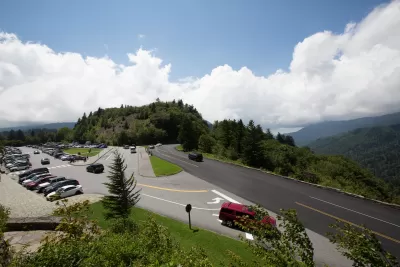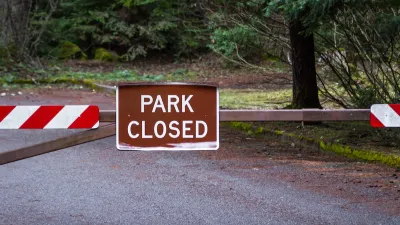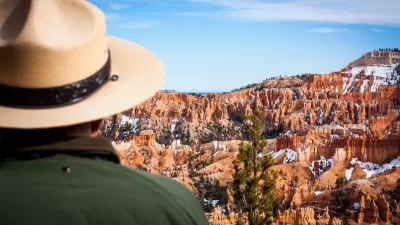The Great Smoky Mountains National Park, the nation's most visited and one of only a handful with no admission fee, could institute a parking fee to pay for much-needed maintenance.

Updated August 15, 2022 to more accurately reflect the status of the proposal at the time of this article. The parking fee plan was proposed in April but not approved until August 2022.
Elizabeth Sims reports on big changes that could be coming to the Great Smoky Mountains National Park, which may start charging for parking to raise revenue for park maintenance in the nation's most popular national park. "With 4,500 parking spaces in the park, the projected revenue gain would be around $10-15 million per year." Parking tags would be available at daily, weekly, and annual rates. "Officials said unofficial roadside parking would be eliminated to help protect resources, improve motorist and pedestrian safety and improve traffic flow through congested areas."
As Sims notes, "In its current state of operation, the Great Smoky Mountains does not have a fee or robust concessions to boost revenues outside the park. Officials said the lack of concessions was by design and has been a successful model with $50 returned to the region for every $1 of federal investment."
Because of deed restrictions on park roads, unlike a parking fee, instituting an entrance fee would require action by the Tennessee state legislature. "The last major infrastructure upgrades came in the 1930s and 1960s, meaning wastewater treatment and freshwater sources are beyond their life cycle. The strain on park employees, infrastructure and natural resources isn’t sustainable despite the dedicated funding of the Great American Outdoors Act."
The park also wants to increase backcountry camping fees and standardize other campsite fees across the park.
FULL STORY: Pay to park: Sweeping changes in the Great Smoky Mountains

Planetizen Federal Action Tracker
A weekly monitor of how Trump’s orders and actions are impacting planners and planning in America.

Chicago’s Ghost Rails
Just beneath the surface of the modern city lie the remnants of its expansive early 20th-century streetcar system.

San Antonio and Austin are Fusing Into one Massive Megaregion
The region spanning the two central Texas cities is growing fast, posing challenges for local infrastructure and water supplies.

Since Zion's Shuttles Went Electric “The Smog is Gone”
Visitors to Zion National Park can enjoy the canyon via the nation’s first fully electric park shuttle system.

Trump Distributing DOT Safety Funds at 1/10 Rate of Biden
Funds for Safe Streets and other transportation safety and equity programs are being held up by administrative reviews and conflicts with the Trump administration’s priorities.

German Cities Subsidize Taxis for Women Amid Wave of Violence
Free or low-cost taxi rides can help women navigate cities more safely, but critics say the programs don't address the root causes of violence against women.
Urban Design for Planners 1: Software Tools
This six-course series explores essential urban design concepts using open source software and equips planners with the tools they need to participate fully in the urban design process.
Planning for Universal Design
Learn the tools for implementing Universal Design in planning regulations.
planning NEXT
Appalachian Highlands Housing Partners
Mpact (founded as Rail~Volution)
City of Camden Redevelopment Agency
City of Astoria
City of Portland
City of Laramie





























